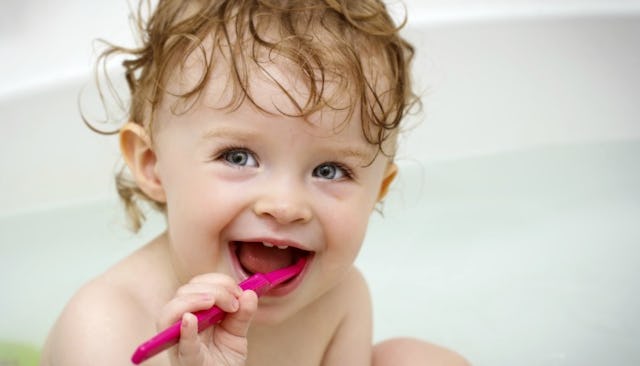Your 1 Year Old Toddler Week 38

Teething is Going to Suck a Little Bit Longer
Shutterstock
No matter how much of an asshole your toddler is being, it all seems to dissolve away with one flash of that sweet smile. And now that he has a mouthful of pearly whites — with some more on the way — it’s more important than ever to establish good oral hygiene habits (besides, his breath had better smell good since he’s always all up in your face).
There’s no need to use toothpaste just yet. A damp, soft-bristled brush is just fine — but if you do have a preference for the paste, make sure you’re using one that’s formulated for kids (and no more than a pea-sized dollop). Brush after each meal. If your little one insists on brushing alone, allow it for a few minutes, then take over the task to make sure it’s done properly.
Remember how much teething sucked? Well it’s going to suck a little bit longer, because between 20-24 months, your toddler will be sprouting upper and lower eye teeth. The same remedies that you used during infancy will still work, though now that she’s older you have more options, such as giving her a celery stick straight from the fridge to gnaw on (just hang around while she’s munching on it). The already-scanty toddler appetite may take a leave of absence in the presence of sore gums, but you can offer cold foods like yogurt that might provide some soothing relief. There can also be a case of extreme crankiness — for your toddler and probably you too — as a direct result of teething. Try to have as much compassion and patience as possible and remember: this too shall pass (as soon as those damn teeth come in).
Scary Mommy Tip: Most dentists agree that the first visit should happen around two years of age, so it never hurts to start asking other parents for recommendations!
HOMEWORK:
5 Vital House Rules For When The Baby Is Teething
Soothing Techniques For Teething Pain
This article was originally published on